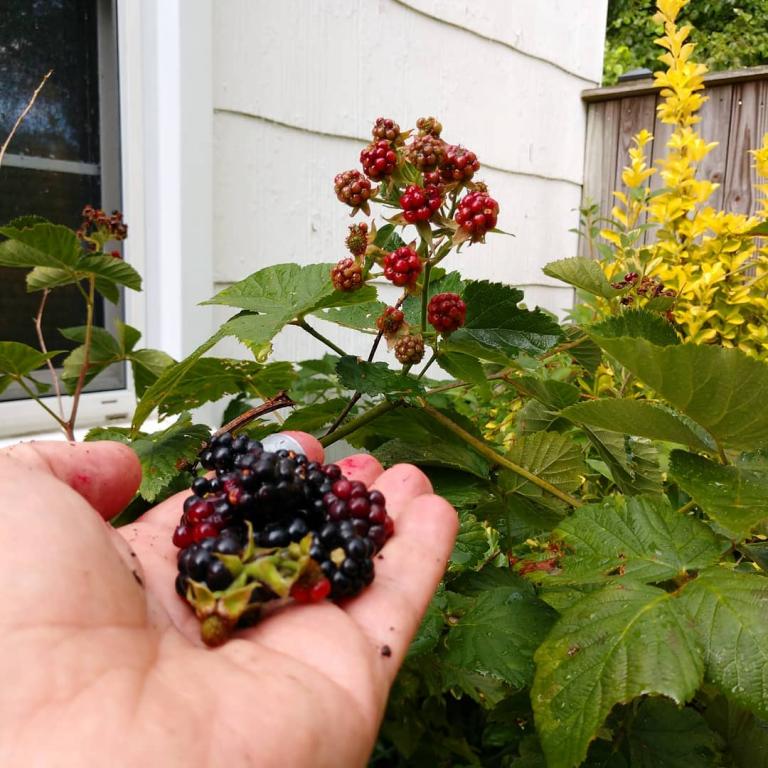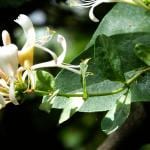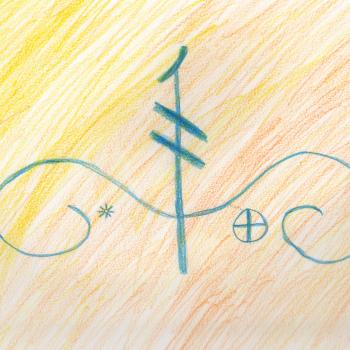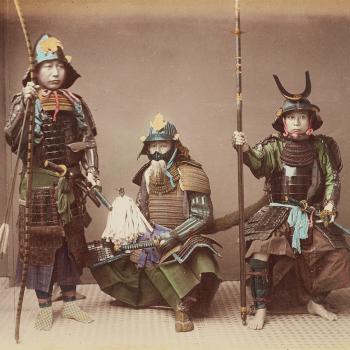The blackberries are starting to get ripe. I picked a handful of them today; I won’t get many before the birds do, but it’s a symbolic harvest.
![]() And it reminds me of a Zen story that is appropriate to the moment, both the global moment of the COVID-19 disaster and the personal disaster I’m experiencing.
And it reminds me of a Zen story that is appropriate to the moment, both the global moment of the COVID-19 disaster and the personal disaster I’m experiencing.
But first, some background.
Today is Lammas, also known as Lughnasadh, a Pagan sabbat (seasonal celebration) which marks the end of summer and the beginning of harvest season. Yes, it is hot enough to fry tofu on the sidewalk, but if the Summer Solstice in June is “midsummer” then summer begins with Beltane and ends with Lammas. Then autumn is Lammas to Samhain; Winter is Samhain to Imbolc; and spring is Imbolc to Beltane. It’s an old British/Celtic way of reckoning the seasons.
(And it nearly matches the traditional Chinese notion of the seasons, in which the lunisolar New Year, near Imbolc, is seen as the start of spring; but that gets complicated by the Taoists wanting to map the seasons onto the Five Phases and sometimes counting “late summer” as a separate season corresponding to the Earth phase — or, in other sources, counting the transition between seasons for Earth.)
Some take August 1 as the date, but August 2 was the date for Lammas on that “Wheel of the Year” poster I had back around 1990 (just as Imbolc was February 2). And in my original little circle of Pagan friends we called it Lammas; though Lughnasadh may have a better historical claim, it will always be Lammas to me.
Today is also my mother’s birthday. I always liked that my Irish heritage came to me through a parent born on (in some reckonings) an old Irish holy day.
But — here’s the personal disaster bit — it is also two days since I told my mother that I must distance myself from her if she is going to choose to enable my brother’s alcoholism.
Regular readers, or people who know me outside the blogosphere, may now be saying, “What?!” I’ve written here about my love for my mother and our relationship over the past few years. We’ve been close.
There’s been a whole lot of discovery and drama in my family the past few weeks. (Why the blog has been quiet.) That itself has been a “harvest” of a sort, I suppose, though a bitter one.
For years now my brother has been living in my mother’s basement, crashing back home after his fiance broke it off with him. He has not been doing well; he’s been minimally employed at best and completely unemployed since late last year, suffering several health problems.
We attributed it to clinical depression and urged him to seek help — I even tried an intervention of sorts, to no avail. Our mother has been completely supporting him. In theory he was supposed to be helping around the house in order to earn his keep, but that rarely happened.
Early in July my brother had a seizure and ended up in the ICU on a ventilator. That’s how we learned he was an alcoholic — explaining much about his adult life.
Neither Mom nor I were aware of his alcoholism. He had a history of irresponsible binge drinking, but I thought he had quit. He wasn’t going out and coming home drunk, which we would have seen. He was continually drinking through the day, his “water bottles” being full of watered-down rum.
Friends of his knew about it, but assumed we knew. An important lesson for us all: don’t assume your friends’ family members know about their shit. Also, addicts are good at hiding their use — which I knew in theory, but is much more vivid now.
There is a Japanese proverb: The man takes a drink, then the drink takes a drink, and then the drink drinks the man. Somewhere along the way, the drink drank my brother.
Now I’m a sucker for a redemption story; in my mind these past few weeks I’ve been dreaming of how good it could be now that we knew the root of my brother’s problems.
But in spite of narrowly escaping death, rather than going to rehab he wants to come home to Mom’s basement. And Mom, full of love but not able to draw an appropriate boundary, has decided to enable him and let him return without treatment.
And I’ve had to draw a boundary of my own and say that I will not be complicit in that enabling. I will not have a relationship with an addict who refuses treatment.
This comes after Mom having her own health crisis, falling spells and a broken arm, and being hospitalized and going through inpatient rehab for physical and occupational therapy. (Quite likely the stress of the situation with my brother helped bring that on.)
I spent the past few weeks managing their affairs while they were both hospitalized. It was work I did gladly, picturing a future where Mom was stronger and my brother had gotten treatment and everything would improve for our family.
Well. No good deed goes unpunished, as they say.
So. That sucks.
The past few days have been among the worst in my life. I find that am estranged from my brother, most likely permanently — I have to think that if you don’t seek rehab after ending up on a ventilator, you’re probably not ever going to. And I’m left much more distant from my beloved mother that I want to be, though I’m going to try to keep the connection open.
My heart is heavy.
And yet.
And yet.
The world goes on. The sun shines, the rain falls, beautiful and tragic things happen.
The berries still ripen in the sun and become sweet.
An old Zen story, attributed to the Buddha himself, tells us of a man who encountered a tiger. He ran and the tiger followed, until they came to a cliff. The man grabbed hold of a vine swung himself down over the edge.
The man looked down to the base of the cliff to see another tiger waiting for him, as the first one sniffed at him from above.
Two mice (“one white and one black”, according to Senzaki and Reps’s version of the story, onto which we may project all sort of esoteric interpretations) started to gnaw away the vine the man was holding.
He saw a berry near him. Holding the vine with one hand, he plucked it and ate it. How sweet it tasted !
(And yes, in Senzaki and Reps’s version it’s a strawberry, not a blackberry. Close enough. The story was referenced in an episode of The Midnight Gospel.)
There is no escape from suffering. It’s the First Noble Truth. And yet, in among the suffering is also beauty.
Indeed the question of what is “suffering” and what is “beauty” is a distinction created by the mind. While pain — both physical and emotional — comes with the territory of being an animate lump of carbon, much of our suffering is drama created by our minds.
So perhaps Lammas, that first harvest, is an opportunity to pause and consider “interbeing”.
This thing we call “I” is here only because of a whole host of conditions. My body is formed from the fruits and the grains, grown from the earth and watered by the rains and powered by the distant nuclear fire of the sun.
Take any of these things away and I am not here. If we see that the harvest is the bounty of the earth, and that our bodies are not separate from the harvest that we eat, we see our unity with the universe.
We draw boundaries within the dance of atoms and energy and say “this is me, this is the air, this is the sun, this is a berry”, and yet this is a mental construction, a matter of convention. Quite possibly some being from the fifth dimension would not see me and the tree outside as separate as we exchange oxygen and carbon dioxide, would not choose to draw a boundary at my skin to understand the process.
This thing we call “I” is here only because of my mother, and my late father, and my messed-up brother, and everyone else on the planet too.
There’s no escaping the tangled mess. No escaping the suffering. It is us.
And yet. The blackberries are sweet.


















